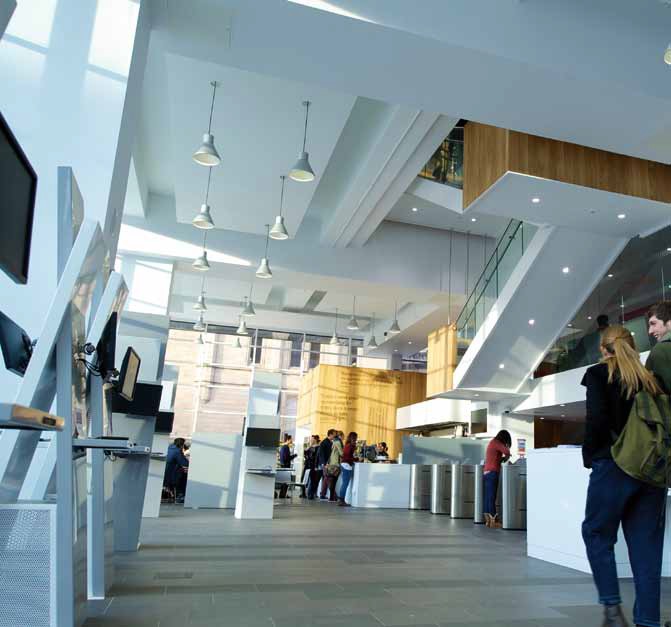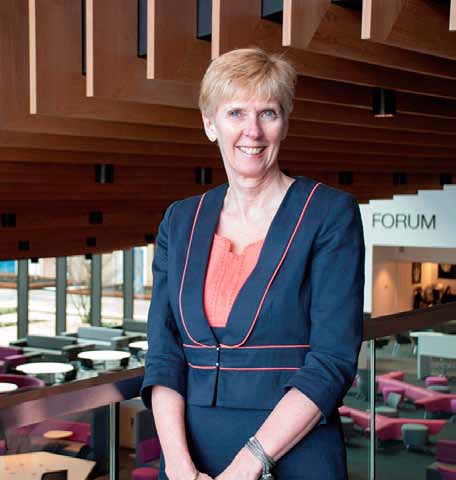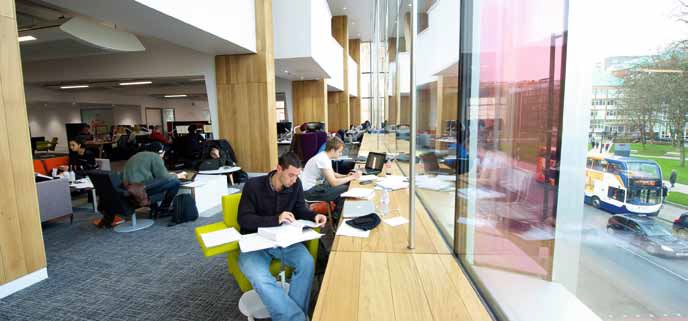University Estates conference shines light on challenging year ahead - A review of the 2014 AUDE Annual Conference
With over 160 universities in the UK, students have got more choice than ever on where to study, leaving universities working hard to attract prospective students to their institutions. There are many ways to separate yourself from the competition, unique courses, great careers prospects and first-class lecturers.
One crucial way to attract prospective students is through outstanding facilities, providing an environment catered specifically to student needs. This responsibility falls largely on the Directors of Estates, who together form AUDE (The Association of University Directors of Estates).
 This year, hosted at Roehampton University, in an unseasonably sunny April, AUDE held their annual conference which brought together Directors of Estates and Facilities from universities from across the UK, as well as international delegates from Australia, North America and South Africa. Campus Estate Management was invited to get a rare insight into the world of university estate management.
This year, hosted at Roehampton University, in an unseasonably sunny April, AUDE held their annual conference which brought together Directors of Estates and Facilities from universities from across the UK, as well as international delegates from Australia, North America and South Africa. Campus Estate Management was invited to get a rare insight into the world of university estate management.
The conference included speakers from across the higher education sector from organisations such as British Universities Finance Directors Group (BUFDG), Universities UK (UUK) and the Higher Foundation Council for England (HEFCE).
This provided a unique experience for Directors of Estates to gain insight into some of the challenges the sector faces. Sir Jonathon Porritt, Environmentalist and Chancellor of Keele University discussed a growing need for environmentally friendly and sustainable developments. Bob Rabdon, Chief Financial Officer at the University of Sheffield and Chair of BUFDG, discussed the financial challenges of decreased government funding and James Pestell, Director of Marketing at the University of London, talked about the communications challenges universities face in positioning themselves as a brand.
It was also interesting to hear the student voice being represented at the conference, with key note speaker Colum McGuire, Vice President of Welfare at NUS, discussing the need for affordable accommodation, well considered study space and how estate and campus services are integral to the student experience at university. AUDE has always strived to enhance the student experience, either through providing excellent student facilities or by offering outstanding learning, teaching and research environments.
Intrigued to find out more about current students’ points of view on their university facilities, AUDE commissioned research asking 2,000 students about the condition of their university’s facilities and whether or not they played a role in choosing where to study. The results were overwhelmingly positive with 95% of those questioned stating that their universities were well looked after and 77% answering that a university’s facilities played a role in their choice to study there. Clearly, university facilities play a crucial role in attracting students and, despite a growing number of student complaints, the vast majority are happy with the facilities provided, a sentiment which was echoed by Colum during the conference.
We spoke to several AUDE members to get their views on both the conference and the challenges they’re expecting over the coming year.
Andrew Burgess, Director of Estates at Loughborough University, AUDE Chair
Competition between institutions to attract students is definitely one of the biggest pressures on university estates, with students’ expectations higher than ever in light of increased tuition fees.
The UK university sector spent about £3.1bn on its estate last year, and I anticipate this level remaining steady during the coming years, despite cuts in government funding for capital projects in the sector.
It was very interesting to hear the students’ point of view at this year’s conference, they are clearly aware of some of the challenges universities are facing and understand the importance of university facilities. This view was mirrored in a recent survey we conducted where it was also clear that students value university facilities very highly. They came a close second behind courses when choosing where to study. This means universities have no choice but to continue to fund developments in order to remain competitive and continue to attract students who are more aware than ever about the value of the services they are being provided.
The conference also highlighted a growing concern within the sector over the impact an improving market for construction would have on tender prices. Universities have been a mainstay of work for the industry during recession, and some strong relationships have developed. Maintaining these relationships will be a challenge in a more vibrant tendering market, but I hope that some of the partnerships from leaner times will flourish.
Sue Holmes, Director of Estates at Oxford Brookes University
 The AUDE conference for me is always the annual opportunity to share best practice with colleagues and hear from our sector’s experts. This year was no exception. One of the highlights for me was Ian Diamond’s session on further efficiency and effectiveness. In a climate where budgets are clearly under pressure, his guidance and industry knowledge is invaluable. One other of the keynote’s that resonated well was Sir Jonathon Porritt, founder of Forum for the Future, who brought the green agenda to the fore and challenged all delegates to think hard about students on their campus, acknowledging that our lack of action now could ruin their future world.
The AUDE conference for me is always the annual opportunity to share best practice with colleagues and hear from our sector’s experts. This year was no exception. One of the highlights for me was Ian Diamond’s session on further efficiency and effectiveness. In a climate where budgets are clearly under pressure, his guidance and industry knowledge is invaluable. One other of the keynote’s that resonated well was Sir Jonathon Porritt, founder of Forum for the Future, who brought the green agenda to the fore and challenged all delegates to think hard about students on their campus, acknowledging that our lack of action now could ruin their future world.
This proved a motivating statement for my afternoon workshop on the league tables we produce, specifically AUDE’s EMR report. The discussion ranged from the collection of data, the use of reports, sector benchmarks and indicators through to the use of the data set by People and Planet. The latter league table ranks the green credentials of UK universities and is acknowledged as a valuable tool and accolade for the high ranking universities, as well as an important nudge for those who can improve. Much of the conversation focused on context and trends, not duplicating data and discussing key drivers in estate management and planning.
While many Directors of Estates acknowledged that filling in the lengthy application could prove arduous, our spokespeople from HESA and People & Planet provided support in ways the form could be tackled and gave us examples of the key learnings and best practice gleaned from the report.’
The People & Planet Green Leagueis published in the Guardian.
Alan Burrell, Director of Estates at The Open University
The main highlights for me included the sessions from Ken Livingstone and Paul Fletcher, who both made a number of important comments about teamwork. The latter gave great insight into the effects of positive thinking on others and how this can translate into better performance. The talk from an Executive member of NUS also gave an interesting and sometimes surprising aspect of the student’s perspective when choosing an institution.
 This year’s conference highlighted a challenging year ahead but also how well Directors of Estates have been performing the job of balancing growing student expectation, decreased government funding and the need for green and sustainably developments. This isn’t, however, the time for Directors of Estates to congratulate themselves on a successful year, they have no choice but to continue to strengthen. New projects and redevelopments are continuing at universities across the country and universities need to do whatever they can to continue to attract new students in the highly competitive marketplace.
This year’s conference highlighted a challenging year ahead but also how well Directors of Estates have been performing the job of balancing growing student expectation, decreased government funding and the need for green and sustainably developments. This isn’t, however, the time for Directors of Estates to congratulate themselves on a successful year, they have no choice but to continue to strengthen. New projects and redevelopments are continuing at universities across the country and universities need to do whatever they can to continue to attract new students in the highly competitive marketplace.


